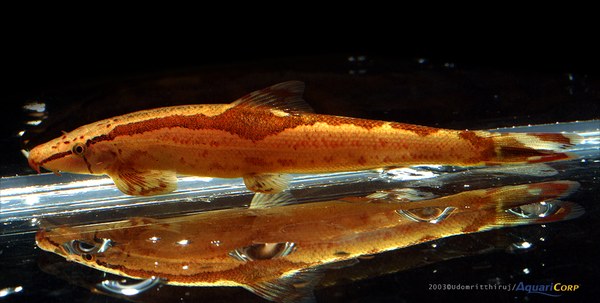Homaloptera bilineata
Summary

Scientific Name: Homaloptera bilineata (Blyth, 1860)
Common name: Lizard Loach, Gecko Loach.
Synonyms: Nemacheilus serpentarius
Distribution: Malaysia, Myanmar.
Sexual Dimorphism: Females noticeably plumper in healthy, well-fed fish.
Maximum size: 4 inches
Similar to: Homaloptera orthogoniata, H. confuzona, H. ogilviei, H. parclitella
Care: Inhabit fast flowing streams over boulders, often in forested areas. Collection reports describe "Blackwater" conditions at many sites. Aquarium should duplicate these conditions, including high water flow, as these fish have very high oxygen requirements.
Homaloptera species require similar conditions to other Hillstream species. All need excellent water-flow and aeration, numerous rocky hiding places and smooth pebbles and boulders to graze over. Lighting should be bright to encourage algal growth in the aquarium. Plants are not necessary as the fish do not normally encounter them in the wild, but they will help with water-quality. Suitable plants for high-flow environments are Anubias and Microsoreum. These will grow on rockwork or driftwood.
See: Hillstream Loaches - The Specialists at Life In The Fast Lane for more detailed explanation.
Feeding: Good quality flake, sinking pellets, algae wafers, thawed frozen Bloodworm, Mysis Shrimp, natural algae an advantage.
Water parameters: pH: 6.5-7.5. Hardness: Medium Soft to Medium. Max dh: 12
Temperature: 70ºF to 78ºF (21-25.5°C)
Breeding: Not bred in aquaria.
Notes
This species is a very beautiful addition to a suitably set up aquarium. This lovely fish does not travel well and can be somewhat difficult to acclimatize to aquarium conditions, but once settled may live for around 5 years.
 They are best kept in
groups of their own kind, but will also mix well with other Hillstream type
loaches. They are peaceful and their only problem is the crazy frenzy they will
go into when their incredibly sensitive sense of smell detects food in the tank.
At that time, they will rush around the aquarium knocking smaller fish aside.
They are best kept in
groups of their own kind, but will also mix well with other Hillstream type
loaches. They are peaceful and their only problem is the crazy frenzy they will
go into when their incredibly sensitive sense of smell detects food in the tank.
At that time, they will rush around the aquarium knocking smaller fish aside.
It is easy to confuse this species with other's in the complex because in all species, variation of pattern means some fish look quite similar to other species. All the Orthogoniata Complex have nose to eye stripes, but H. bilineata is named after the two highly distinctive lines that run from these to a saddle under the dorsal fin. When viewed from above, these form two roughly parallel lines. There are small or absent dorsal area saddles. Basically, the stripes are the most noticeable markings on this species, hence the name.
All species in this complex have different scale keel shape and size. This may be used by the aquarist as a means of identification if one can enlarge a high-quality digital image sufficiently to show the detail.
Details of scale keels are available here.
Photo Gallery
Click to view all images of this species! |
|
Document Actions


